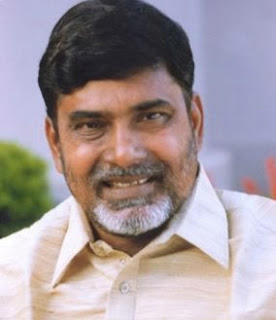Mr. N. Chandrababu Naidu, was born in the Naravaripally village of Chittoor district on 20th April, 1950. His late father Sri N.K. Naidu was an agriculturist and his mother Smt.Ammanamma is a housewife. Mr. Naidu had his school education in Chandragiri and his college education at the Sri Venkateswara Arts College, Tirupati. He did his Masters in Economics from the Sri Venkateswara University, Tirupati. He was working towards a Ph.D. degree at the same university, when he took to politics.
Mr. Naidu held various positions of office in his college and organised a number of social activities. Following the 1977 cyclone, which devastated Diviseema taluk of Krishna district, he actively organised donations and relief material from Chittoor district for the cyclone victims. Mr. Naidu has been evincing a keen interest in rural development activities in general and, the upliftment of the poor and downtrodden sections of society in particular.
In 1994, he was reelected to the Assembly from Kuppam constituency with a large majority of 57,000 votes and held the important portfolios of Revenue and Finance. During this tenure Mr. Naidu systematically introduced transparency in Government, thus breaking the tradition of inordinate secrecy in the Finance department.
The mantle of leadership fell on the shoulders of Mr. Naidu at a most critical juncture in the State's politics. Following a popular upsurge in the party, Mr. Naidu was unanimously elected as the Chief Minister of Andhra Pradesh on 1 September 1995.
Following the elections to the State assembly wherein the Telugu Desam Party led by Mr. Naidu emerged as a winner, he was sworn in on 11 October 1999 as the Chief Minister of Andhra Pradesh for the second term. He was elected with a majority of more than 65,000 votes.
The Chief Minister has a modern outlook to administration. His style of functioning is more akin to that of a CEO rather than a traditional politician. The Chief Minister has a firm conviction that modern technology should be used in the service of the common man. Consequently, he lays great emphasis on the use of modern information technology in Government. He would like the State to be run professionally as an efficient organisation rather than as a bureaucracy saddled with red-tape.
The Chief Minister's vision for the future includes multidimensional development of all citizens of the State. He is keen to develop the full potential of all citizens based on a strong moral foundation. The Chief Minister has been propagating a return to ethical and value based precepts in day-to-day life. In keeping with this commitment, he has launched new initiatives, like the Janmabhoomi programme which aims at achieving excellence in all walks of life and focuses on community-building through team work.
In order to achieve greater involvement of the people in the implementation of Government programmes, the Chief Minister has been encouraging the concept of social audit, which involves making information available to all citizens about the works being taken up with public funds in their area. The Chief Minister has also taken the initiative for setting up self-help groups like water users' associations, for involving farmers in the management of irrigation systems. Other self-help groups like Watershed Development Committees, Womens' groups, Youth groups, Village Education Committees and Village Health Committees have also been set up. These self-help groups have significantly contributed to removing intermediaries and have been widely acknowledged for improving the condition of the poor.
The Chief Minister has initiated an exercise to define Vision 2020 for the state. According to the Chief Minister, "Our vision of Andhra Pradesh is a State where poverty is totally eradicated; where every man, woman and child has access to not just the basic minimum needs, but to all opportunities for leading a happy and fulfilling life; a knowledge and learning society built on the values of hard work, honesty, discipline and a collective sense of purpose." This vision reflects the Chief Minister's forward looking perspective on the state's development, and the details of the vision are proposed to be fine-tuned in consultation with the people on a continuing basis.
The Chief Minister is undertaking administrative reforms in right earnest and would like to emphasise as much on processes of 'transformating' as on 'informating' within Government. As part of the Administrative Reforms, the Chief Minister would like to use Information Technology for providing better quality of governance for the common man.
Mr. Chandrababu Naidu has drawn attention and has concentrated on evolving a new way looking at Centre-State finance relations. He has spearheaded the campaign for fiscal federalism in the wake of the recommendations of the Eleventh Finance Commission. He has emphasised on equity and efficiency in the devolution of Central revenues and sharing of resources between the Centre and the States.
The Chief Minister has won numerous awards including " IT Indian of the Milleneum' (India Today) Business Person of the Year ( Economic Times ) member of the World Economic Forum's Dream Cabinet and South Asian of the Year ( Time Asia ).
The Chief Minister was chosen as one of 50 leaders at the forefront of change in the year 2000 by the Business Week magazine for being an unflinching proponent of technology and for his drive to transform the State.
The Chief Minister is married to Mrs. Bhuvaneswari and has a son Lokesh. His father-in-law, the late Mr. N.T. Rama Rao, was one of the most accomplished film actors of Telugu cinema, who later founded the Telugu Desam Party and was also the Chief Minister of Andhra Pradesh.
Mr. Naidu held various positions of office in his college and organised a number of social activities. Following the 1977 cyclone, which devastated Diviseema taluk of Krishna district, he actively organised donations and relief material from Chittoor district for the cyclone victims. Mr. Naidu has been evincing a keen interest in rural development activities in general and, the upliftment of the poor and downtrodden sections of society in particular.
In 1994, he was reelected to the Assembly from Kuppam constituency with a large majority of 57,000 votes and held the important portfolios of Revenue and Finance. During this tenure Mr. Naidu systematically introduced transparency in Government, thus breaking the tradition of inordinate secrecy in the Finance department.
The mantle of leadership fell on the shoulders of Mr. Naidu at a most critical juncture in the State's politics. Following a popular upsurge in the party, Mr. Naidu was unanimously elected as the Chief Minister of Andhra Pradesh on 1 September 1995.
Following the elections to the State assembly wherein the Telugu Desam Party led by Mr. Naidu emerged as a winner, he was sworn in on 11 October 1999 as the Chief Minister of Andhra Pradesh for the second term. He was elected with a majority of more than 65,000 votes.
The Chief Minister has a modern outlook to administration. His style of functioning is more akin to that of a CEO rather than a traditional politician. The Chief Minister has a firm conviction that modern technology should be used in the service of the common man. Consequently, he lays great emphasis on the use of modern information technology in Government. He would like the State to be run professionally as an efficient organisation rather than as a bureaucracy saddled with red-tape.
The Chief Minister's vision for the future includes multidimensional development of all citizens of the State. He is keen to develop the full potential of all citizens based on a strong moral foundation. The Chief Minister has been propagating a return to ethical and value based precepts in day-to-day life. In keeping with this commitment, he has launched new initiatives, like the Janmabhoomi programme which aims at achieving excellence in all walks of life and focuses on community-building through team work.
In order to achieve greater involvement of the people in the implementation of Government programmes, the Chief Minister has been encouraging the concept of social audit, which involves making information available to all citizens about the works being taken up with public funds in their area. The Chief Minister has also taken the initiative for setting up self-help groups like water users' associations, for involving farmers in the management of irrigation systems. Other self-help groups like Watershed Development Committees, Womens' groups, Youth groups, Village Education Committees and Village Health Committees have also been set up. These self-help groups have significantly contributed to removing intermediaries and have been widely acknowledged for improving the condition of the poor.
The Chief Minister has initiated an exercise to define Vision 2020 for the state. According to the Chief Minister, "Our vision of Andhra Pradesh is a State where poverty is totally eradicated; where every man, woman and child has access to not just the basic minimum needs, but to all opportunities for leading a happy and fulfilling life; a knowledge and learning society built on the values of hard work, honesty, discipline and a collective sense of purpose." This vision reflects the Chief Minister's forward looking perspective on the state's development, and the details of the vision are proposed to be fine-tuned in consultation with the people on a continuing basis.
The Chief Minister is undertaking administrative reforms in right earnest and would like to emphasise as much on processes of 'transformating' as on 'informating' within Government. As part of the Administrative Reforms, the Chief Minister would like to use Information Technology for providing better quality of governance for the common man.
Mr. Chandrababu Naidu has drawn attention and has concentrated on evolving a new way looking at Centre-State finance relations. He has spearheaded the campaign for fiscal federalism in the wake of the recommendations of the Eleventh Finance Commission. He has emphasised on equity and efficiency in the devolution of Central revenues and sharing of resources between the Centre and the States.
The Chief Minister has won numerous awards including " IT Indian of the Milleneum' (India Today) Business Person of the Year ( Economic Times ) member of the World Economic Forum's Dream Cabinet and South Asian of the Year ( Time Asia ).
The Chief Minister was chosen as one of 50 leaders at the forefront of change in the year 2000 by the Business Week magazine for being an unflinching proponent of technology and for his drive to transform the State.
The Chief Minister is married to Mrs. Bhuvaneswari and has a son Lokesh. His father-in-law, the late Mr. N.T. Rama Rao, was one of the most accomplished film actors of Telugu cinema, who later founded the Telugu Desam Party and was also the Chief Minister of Andhra Pradesh.

